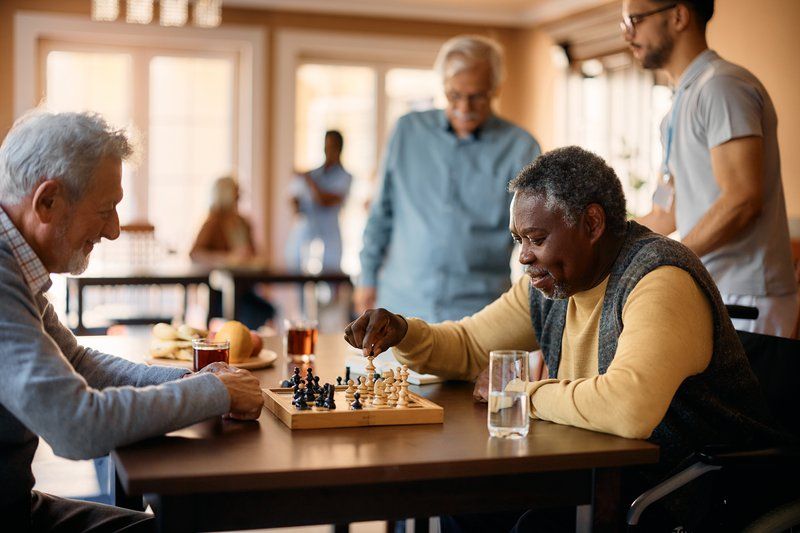BLOG
How Residential Care Homes Provide a Personal Touch to Senior Living
When exploring senior living options, residential care homes set the benchmark for their unwavering commitment to providing a personal touch that goes beyond traditional assisted living facilities. These homes prioritize individualized care, fostering a sense of home-like environments, and tailoring experiences for a positive senior living experience.
By embracing the holistic care model, embracing human-centric practices, and nurturing meaningful connections, these care homes create a supportive community that empowers and uplifts its residents. This comprehensive guide aims to uncover the human-centric approach of residential care homes, showcasing how they redefine senior living through personalized care, meaningful engagement, and a profound commitment to enhancing the quality of life for every individual.
Residential Care Homes: Understanding the Holistic Care Model
Residential care homes are at the forefront of implementing a holistic care model that prioritizes the overall well-being of their residents. This comprehensive approach integrates physical, emotional, and social dimensions, ensuring a nurturing environment that fosters a high quality of life.

- Personalized Activities: Through tailored recreational and therapeutic activities, residents engage in meaningful pursuits that cater to their individual preferences and capabilities. These activities contribute significantly to cognitive stimulation and emotional fulfillment, promoting a sense of purpose and accomplishment.
- Social Engagement: The emphasis on social interaction within residential care homes cultivates a vibrant community where residents build connections, share experiences, and partake in communal activities. This social engagement plays a pivotal role in mitigating feelings of isolation and loneliness, contributing to a positive and supportive atmosphere.
- Emotional Support: Trained staff members provide compassionate emotional support, recognizing and addressing the unique emotional needs of each resident. By fostering a nurturing and empathetic environment, residential care homes ensure that emotional well-being is central to the holistic care provided to their residents.
By intertwining these elements, care homes create an environment where residents can thrive holistically, embracing a life of purpose, fulfillment, and connection.
Embracing Human-Centric Practices
Residential care homes place a profound emphasis on human-centric practices, recognizing the fundamental importance of dignity, respect, and individual preferences in the care provided to their residents. This person-centered approach is rooted in the belief that each resident is a unique individual deserving of tailored care and support.
- Person-Centered Care: By centering care plans and daily interactions around the preferences, abilities, and personal history of each resident, residential care homes ensure that the individual's identity and autonomy are respected and upheld.
- Empowerment of Residents: Residents are empowered to make choices regarding their daily routines, activities, and personal preferences, fostering a sense of independence and control over their lives. This empowerment contributes to a fulfilling and dignified living experience.
- Compassionate Interactions: The staff at residential care homes are dedicated to fostering compassionate and respectful interactions with the residents, acknowledging their emotions, needs, and desires. This nurturing approach creates an environment where residents feel valued and understood.
Through these human-centric practices, residential care homes create a supportive and empowering atmosphere where residents are not merely recipients of care, but active participants in shaping their own experiences and well-being.
Nurturing Meaningful Connections
These care homes serve as nurturing environments that foster meaningful connections among residents, staff, and families, creating a strong sense of community and belonging.
- Social Interaction: Encouraging social interaction among residents through communal activities, shared meals, and group outings promotes a supportive network within the community, combating feelings of isolation and enhancing overall well-being.
- Personalized Engagement: Staff members engage with each resident on a personal level, taking the time to understand their interests, preferences, and personal histories. This personalized approach cultivates a sense of belonging and strengthens the bond between residents and the care team.
- Supportive Network: Families and friends are integral parts of the residential care home community, participating in events and gatherings that facilitate connections and provide additional support to both residents and staff.
By nurturing these meaningful connections, residential care homes create an atmosphere where residents experience a profound sense of belonging and are surrounded by a supportive network that enriches their lives.

Reflecting on the evolving landscape of senior living within residential care homes, innovative trends and the seamless integration of technology are paving the way for an enhanced quality of life for residents. The commitment to personalized, compassionate care remains unwavering, with a continued focus on creating a nurturing environment that promotes independence, dignity, and purpose. As residential care homes embrace advancements in memory care and holistic well-being, they reinforce their dedication to redefining senior living.
For more information on the transformative approach to memory care and assisted living, we encourage readers to visit Assured Senior Living's Memory Care Services and discover how their human-centric model and commitment to the well-being of residents are shaping the future of senior living.
The best care for what matters most. Contact us today, or download our free Family Decision Toolkit guide for more information.















